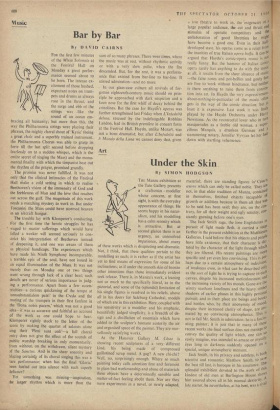Mu si c
Bar by Bar
By DAVID CAIRNS
phrases, the mighty choral shout of 'Kyrie' (being a great choir and a superbly trained instrument, the Philharmonia Chorus was able to grasp its forte till the last split second before dropping fearlessly on to a sudden whisper, which is the entire secret of singing the Mass) and the monu- mental finality with which the timpanist beat out the rhythm of the prayer, promised grandly. The promise was never fulfilled. It was not only that the clinical intimacies of the Festival Hall Make a cold setting in which to realise Beethoven's vision of the immensity of God and the feebleness of Man and the love that reaches out across the gulf. The magnitude of this work needs a matching mystery to work in. But under loscanini the Mass could have stormed heaven in an aircraft hangar. The trouble lay with Klemperer's conducting. For the first time the heroic struggles he has ' waged to master sufferings which would have fellpd a weaker will seemed seriously to con- strict his interpretation of Beethoven instead of deepening it, and one was aware of them as physical handicaps. The experiences which have made his Ninth Symphony incomparable, a terrible epic of the soul, have not issued in an equal illumination of the Mass. It was not merely that on Monday one or two things went wrong through lack of a clear beat; such details, are never of serious importance in judg- ing a performance. Apart from a few eccen- tricities—a curious quickening of the tempo at 'consubstantialem patri' in the Credo and the muting of the trumpets in their first fanfare in the 'Dona nobis pacem,' which was not a good idea—it was as accurate and faithful an account of the work as one could hope to hear. Klemperer rightly stuck to the letter of the Score by making the quartet of soloists alone sing their `Pleni sunt cceIV—a full choral cntry does not give the effect of the sounds of public worship breaking in only momentarily, from without, on the withdrawn, silent mystery of the Sanctus. And in the sheer sonority and blazing certainty' of its choral singing this was a are performance; when has the final 'Gloria' been hurled out into silence with such superb defiance?
Yet something was missing—inspiration, Lhe larger rhythm which is more than the sum of so many phrases. There were times, where the music was at rest, without rhythmic activity or with a very slow pulse, when the fire descended. But, for the rest, it was a perform- ance that existed from bar-line to bar-line. It stirred admiration—and no more.
In our glass-case culture all revivals of for- gotten eighteenth-century music should on prin- ciple be approached with dark suspicion and a keen nose for the first whiff df decay behind the crinolines. But the case for Haydn's operas was further strengthened last Friday when L'Infedelta delusa, rescued by the indefatigable Robbins Landon, had its British premiere in concert form at the Festival Hall. Haydn, unlike Mozart, was not a born dramatist; but after L'Infedelta and // Mondo della Luna we cannot deny that, given a live theatre to work in, the 'exigencies Of 3 large popular audience, the cut and thrust and stimulus of operatic competitors and the collaboration of good librettists be Might have become a good one. Even in their half' developed state, his operas come as a relict from the inanities of true Italian opera buila. It can be argued that Haydn's comic-opera music is not really funny. But the humour of Italian conic opera rarely has anything to do with the music at all; it results from the sheer absence of music —the false noses and pot-bellies and gouty feet are free to work without hindrance. but neither is there anything to raise them from colleen' tion into art. In Haydn the very expressiveness' about-nothing-in-particular of the music often gets in the way of the comic situation; but at least it is expressive. Last week it was f1r1 played by the Haydn Orchestra under Harry Newstone. As the resourceful lover who in turn masquerades as a feeble old woman, a super" cilious Marquis, a drunken German and 3 stammering notary, Jennifer Vyvyan let her hair down with startling vehemence.


















































 Previous page
Previous page